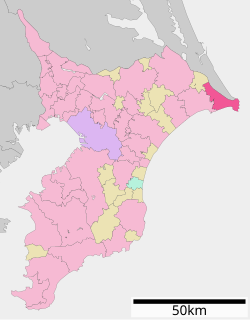Chōshi, Chiba
|
Chōshi 銚子市 |
|||
|---|---|---|---|
| City | |||

Aerial view of Chōshi
|
|||
|
|||
 Location of Chōshi in Chiba Prefecture |
|||
| Coordinates: 35°44′4.7″N 140°49′36.4″E / 35.734639°N 140.826778°ECoordinates: 35°44′4.7″N 140°49′36.4″E / 35.734639°N 140.826778°E | |||
| Country | Japan | ||
| Region | Kanto | ||
| Prefecture | Chiba Prefecture | ||
| Government | |||
| • Mayor | Shinichi Koshikawa (since 17 May 2013) | ||
| Area | |||
| • Total | 84.19 km2 (32.51 sq mi) | ||
| Population (February 1, 2016) | |||
| • Total | 64,079 | ||
| • Density | 761/km2 (1,970/sq mi) | ||
| Time zone | Japan Standard Time (UTC+9) | ||
| - Tree | Sazanka | ||
| - Flower | Ōmatsuyoigusa (Oenothera erythrosepala) | ||
| - Fish | Sardine | ||
| Phone number | 0479-24-8181 | ||
| Address | 1-1 Wakamiyachō, Chōshi-shi, Chiba-ken 288-8601 | ||
| Website | www |
||
Chōshi (銚子市 Chōshi-shi?) is a city in Chiba Prefecture, Japan. As of February 1, 2016, the city has an estimated population of 64,097 and a population density of 813 persons per km². The total area was 84.19 km2 (32.5 sq mi).
Chōshi is the easternmost city in the Greater Tokyo Area, and Cape Inubō, within the city, is the easternmost point in the Kantō region. Chōshi is noted for its dramatic sea coast.
Chiba Prefecture
Ibaraki Prefecture
Chōshi has a humid subtropical climate (Köppen climate classification Cfa) with very warm summers and cool winters. Precipitation is significant throughout the year, although the winter months are slightly drier.
The commercial fishing and soy sauce industries were developed in Chōshi by the Tokugawa shogunate during the Edo period (1603 – 1868). Their development continued in the early industrialization of Japan in the Meiji period (1868 – 1912). Noted soy sauce producer Yamasa Corporation was incorporated in 1928, and Higeta Corporation in 1932. Chōshi was elevated to city status on February 11, 1933. Chōshi was a center of industrial unrest in the early 20th century; there were numerous strikes and labor disputes at the soy sauce factories, and residents attacked the government offices in 1930 over heavy taxation and unaccounted expenditures by municipal authorities.
...
Wikipedia



